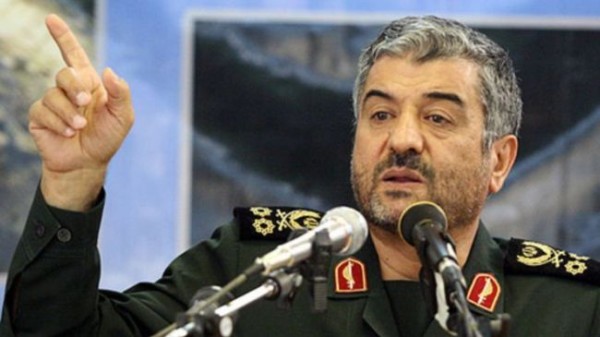 The Iranian interest section in Cairo has dismissed as untrue anti-Saudi remarks attributed to IRGC chief Major General Mohammad Ali Jafari.
The Iranian interest section in Cairo has dismissed as untrue anti-Saudi remarks attributed to IRGC chief Major General Mohammad Ali Jafari.
An Egyptian newspaper had quoted Jafari as saying, “Saudi Arabia is our enemy, not Israel,” Iran’s Fars reported on Sunday.
Egypt’s Al-Watan daily in an article titled “Iran: Saudi Arabia is our enemy, not Israel”, attributed the anti-Saudi remarks to the IRGC Commander.
“The title, content and conclusion of the article have been written based on changes to the reality, references to some unprofessional news reports and false attributions to the Iranian official,” Iran’s Interest Section said in a statement on Sunday without revealing the exact statement made by Jaafari.
The commander of the Islamic Revolution Guards Corps (IRGC) Quds Major General Qassem Soleimani described the Saudi regime as ‘illegitimate’ in a speech on Sunday in the southern Iranian city of Kerman and denied that Iran is after Saudi Arabia .
“Nowhere in the Islamic Revolution’s history have we sought any adventure against Saudis and their government, though they are illegitimate, and despite the fact that their people do not have any role in the ruling system and government, and that the government is controlled by a family,” Soleimani said.
The region’s rivalry, between Saudi Arabia and Iran, has become rapidly and significantly more toxic in the past few weeks, and is already having repercussions across the Middle East.
On Saturday January 2nd Tehran attacked the Saudi embassy, ransacking and burning it as Iran ignored or refused Saudi requests to protect the building. Saudi Arabia formally broke off diplomatic relations with Iran on Sunday Jan. 3d , and on Monday said it would cut commercial ties and ban Saudi travel to Iran as well. Sudan and Bahrain, both Saudi allies, severed ties as well.
Saudi Arabia and Iran see one another as enemies, and are locked in an escalating competition for influence and dominance of the Middle East, according to observers. That rivalry goes far beyond just words, with both countries backing militant groups and proxy forces throughout the region, particularly in Syria. Their competition is resulting in growing violence along Sunni-Shiite lines.
That’s not just bad for Saudi Arabia and Iran — it is bad for the entire Middle East, as both regional conflicts such as Syria and generalized Sunni-Shiite tension are likely to increase.
As a result of this feud Lebanon has already lost $4 billion in Saudi grants because Riyadh was angered by the failure of Lebanon’s Hezbollah-backed foreign minister to support an Arab League resolution condemning attacks on Saudi diplomatic missions in Iran in January following the execution of a Shiite cleric activist in Saudi Arabia.
Since then, Saudi Arabia, Bahrain and the United Arab Emirates have told their citizens not to travel to Lebanon, and the Gulf Co-operation Council (GCC) has designated Hezbollah a terrorist group, accusing it of “hostile acts”.
The GCC’s move was followed a by a similar move by the Arab League branding Hezbollah as a terrorist organization.
Today Bahrain escalated its war against Hezbollah . Its government announced that several Lebanese nationals have been deported.
Once lauded in the Arab world as a heroic resistance movement that stood up to Israel, Hezbollah has seen its popularity plummet in Lebanon and among Sunni Muslims because of its military support for Syrian President Bashar Assad and for interference in the internal affairs of several Arab countries.
Several observers are of the opinion that Hezbollah has ceased being a resistance movement and is behaving as as a mercenary army acting on orders by Iran.
Lebanon has been without a president since May 2014 when Michel Salesman’s term ended, but the iranian backed Hezbollah has been preventing the parliament from electing a new president.

Leave a Reply
You must be logged in to post a comment.